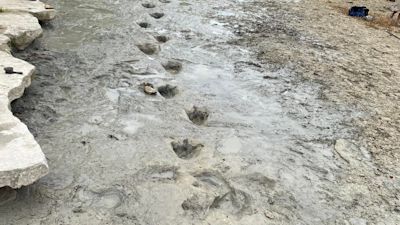Severe drought reveals dinosaur tracks from 113 million years ago in Texas

A summer of drought has revealed long-submerged relics across the globe. A park in Texas now claims one of the oldest revealed this summer – dinosaur footprints dating back over 113 million years. The Dinosaur Valley State Park near Fort Worth, Texas, famous for exactly what its name suggests, has discovered dinosaur footprints that have historically been covered by water and sediment.
Now that a summer of drought has left its Paluxy River shrinking, tracks from millions of years ago were revealed for a few days before rains submerged them once again. They were preserved for millions of years under layers of of sediment and clay and limestone. Park officials say they may be the longest tracks made by a single dinosaur in North America.
While these tracks haven't become visible in at least 20 years, park officials say it's common for different tracks to become visible and disappear throughout the park based on weather.
Near Las Vegas, human remains have been uncovered by the drought.
In four instances since May, remains have been found at Lake Mead National Recreation Area, due to the Colorado river's shrinking shoreline.
In Galicia, Spain, the low water levels have revealed a Roman camp, Aquis Querquennis, on the banks of the Limia River. It’s usually under water but the high temperatures have sunk the water levels to a low enough level for it to rise above the surface once again.
Want a quick and expert briefing on the biggest news stories? Listen to our latest podcasts to find out What You Need To Know